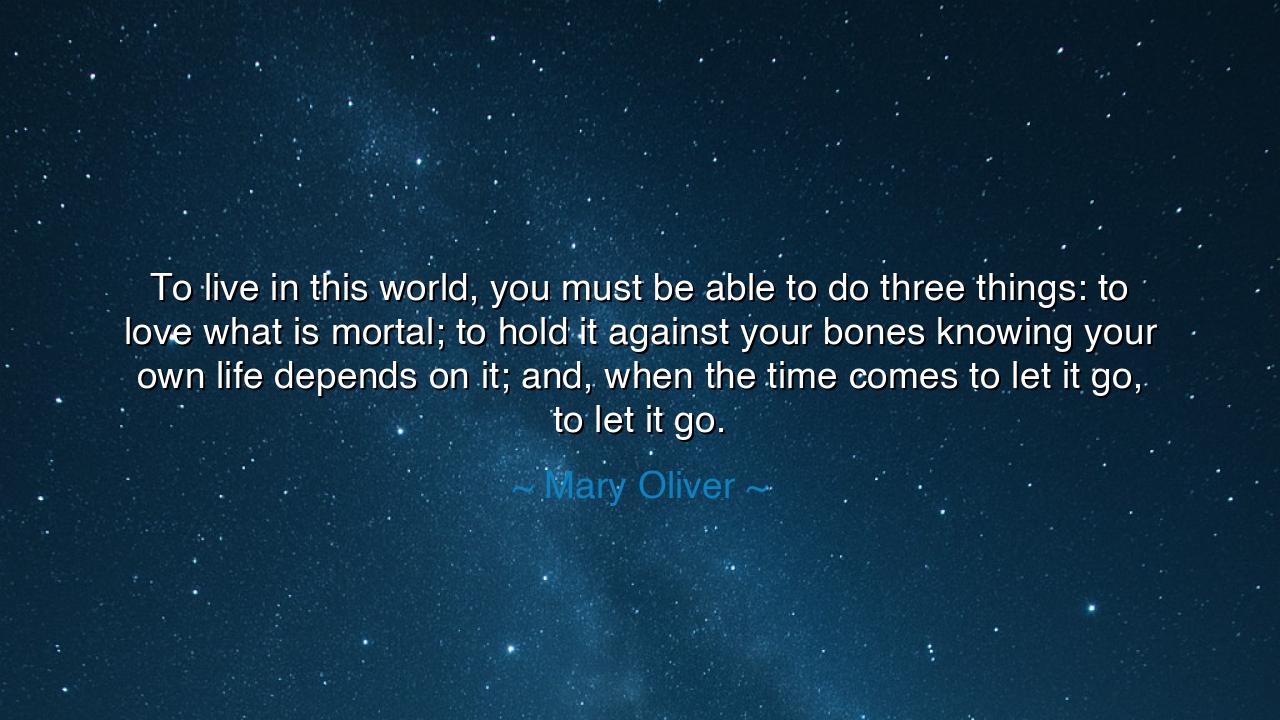
To live in this world, you must be able to do three things: to
To live in this world, you must be able to do three things: to love what is mortal; to hold it against your bones knowing your own life depends on it; and, when the time comes to let it go, to let it go.






"To live in this world, you must be able to do three things: to love what is mortal; to hold it against your bones knowing your own life depends on it; and, when the time comes to let it go, to let it go." These words of Mary Oliver resonate with the quiet, yet profound wisdom of the natural world, calling us to live with both passion and detachment. To love what is mortal, to embrace the fleeting beauty of life, is one of the most powerful and humbling truths we can learn. Oliver teaches us not just to cherish the temporary, but to understand the interconnectedness of all things, and the inevitability of loss. In these three simple lessons, she encapsulates the full arc of existence — love, attachment, and release — and the path to living fully in this world.
The ancients understood the nature of mortality and love, often framing these experiences as central to the human condition. The Stoics, for example, believed that to live virtuously, one must be attuned to the transitory nature of life. Epictetus, a Stoic philosopher, taught that death and loss are not to be feared but accepted as natural parts of the cycle of life. To love what is mortal, he said, is to accept that all things — including ourselves — are in constant change. True freedom comes not from resisting this reality, but from embracing it. In this way, the Stoics spoke of the importance of attachment without clinging, of living fully in the present while understanding the fleeting nature of all things.
Think of the great Achilles, the hero of the Iliad, who knew the price of his glory and the cost of his immortality. He lived with the understanding that his life, though mortal, was worth living fully, with love for his comrades, his land, and the glory of battle. Yet, he also understood the inevitability of death. When the time came for him to face his fate, he did not shrink from it but accepted it, knowing that true greatness lay not in avoiding loss, but in the way we face it. Achilles loved deeply, but when the moment of loss came — in the death of Patroclus, his beloved companion — he was able to channel his grief into purpose, even though he knew that his own end was near. The strength to love and the strength to release are intertwined, and Achilles’ story reflects the paradox of life that Oliver speaks of — loving fully, knowing that everything we cherish is temporary.
In our own lives, we often cling to what is mortal, fearing loss more than we love the present. We hold on tightly to relationships, possessions, or the comforts of life, as if they could last forever. Yet, as Oliver wisely points out, this is not the way to truly live. To hold something against your bones, knowing that your life depends on it, is to love deeply, but without the illusion of permanence. The love we give should be felt fully, in every fiber of our being, yet unburdened by the need to possess or control. When we hold the love of another, or the beauty of a moment, we do so with the understanding that it is not ours to keep, but ours to experience. This is the sacredness of life — to be fully engaged, but to release when the time comes.
Consider the example of Nelson Mandela, who spent 27 years imprisoned for the cause of freedom and justice in South Africa. He was forced to release the love of family, of comfort, and even of his own life’s normalcy for a cause far greater than himself. Yet, Mandela’s love for his people never wavered. Even as he faced immense hardship, he held onto this love tightly, knowing that his own life depended on it. And when the time came, he was able to let go of hatred and vengeance, embracing forgiveness as a means of healing a fractured nation. His love and his willingness to release the past became his true legacy, showing us the transformative power of love and the necessity of release when the time is right.
The lesson here is clear: life is a dance of holding close and letting go. To live well is to love fully, with an understanding that everything is transient, and that love cannot exist in the absence of release. To love what is mortal is to honor its beauty and impermanence, to see in each moment of life a sacred gift, and to give that love freely. But when the time comes, as it always does, we must also have the strength to release — to let go, not out of despair, but with the understanding that this is part of the eternal flow of life. By doing so, we honor what we love most.
Therefore, my children, live with passion and purpose, but remember that nothing in this world is meant to last forever. Love fully, hold what is dear close to your heart, but never forget that release is the other half of love. It is the wisdom of knowing that the beauty of life lies not in its permanence, but in its ephemeral nature. Embrace the fleeting nature of life, for in this embrace, you will find the depth of your love, and in the release, you will find the freedom to continue on the journey with grace and peace.






AAdministratorAdministrator
Welcome, honored guests. Please leave a comment, we will respond soon